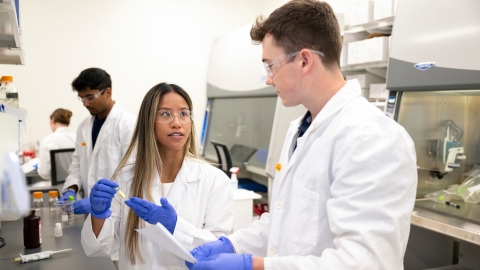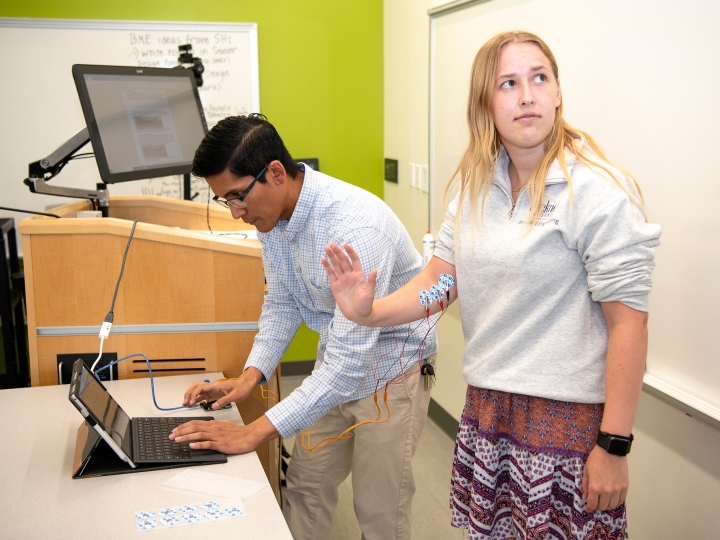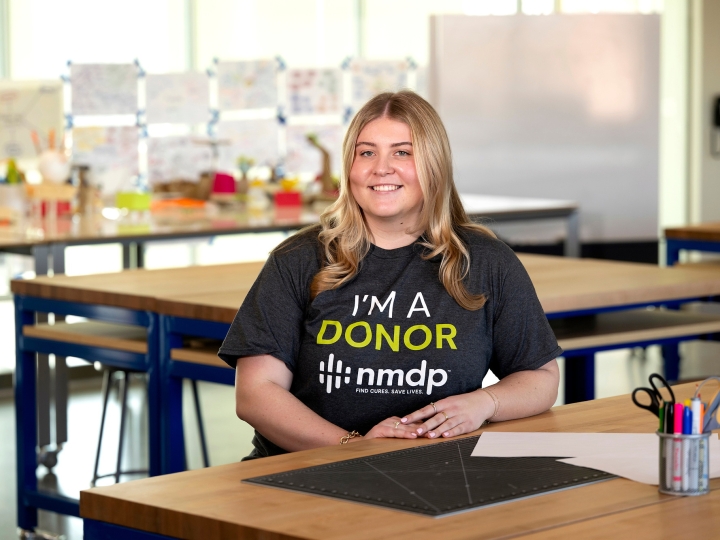
Bucknell Professor Receives NSF Grant to Study Therapeutic Ultrasound
July 3, 2024
Professor Olivia Boerman is leading a biomedical engineering research team, which includes Connor Kozick '26, in studying the effectiveness of ultrasound as a treatment for chronic wounds. Photo by Emily Paine, Marketing & Communications
The National Science Foundation Directorate for Engineering has awarded Professor Olivia Boerman, biomedical engineering, a two-year NSF Engineering Research Initiation (ERI) Grant in the amount of $199,940. This grant will support Boerman's investigative research into the therapeutic applications of ultrasound and the expansion of regenerative medicine education for underrepresented college and high school students.
"Tissue engineering, or regenerative medicine, is essentially engineering solutions for the body to help it regenerate itself," says Boerman. "There's a lot of promising research around therapeutic ultrasound and healing bone fractures and chronic wounds. But the big question is: How does ultrasound advance healing?"
Human clinical studies, which Boerman participated in as a doctoral researcher, have already revealed that therapeutic ultrasound can promote advanced healing in chronic wounds. With weekly 15-minute sessions, low-intensity, low-frequency ultrasound has been shown to reduce the healing time of venous leg ulcers and diabetic foot ulcers from 12 months to just four weeks. What Boerman's research seeks to demystify is the biological mechanisms that underlie the healing process. "Chronic wounds lack blood vessels and as a result lack oxygen and nutrients. I hypothesize that if we can increase blood vessel growth, then hopefully, we can increase oxygen and nutrient flow to the wound area, which then helps the healing process," says Boerman.
Both blood vessel cells and immune cells play a role in the process of angiogenesis, the creation of blood vessels, which has been shown to be critical in the healing of damaged tissues. "With this grant, we'll apply ultrasound to both blood vessels and immune cells to study how they interact with one another under ultrasound," says Boerman. "If we see that ultrasound stimulates blood vessel growth, then there are so many other applications in which ultrasound can be used."
Over the summer, Boerman and the six students in her lab will inject blood vessel cells into a 3-D collagen structure, upon which ultrasound waves will be applied to the media for 15-minute intervals. "Afterward, we measure things like protein secretion, RNA, how quickly they move, how many there are, and if they've grown as an indication of possible angiogenesis," she says. The same process will be applied to macrophages, a type of early onset immune cells, to study the role that ultrasound plays in decreasing inflammation in chronic wounds.
"The second aim of the grant is to perform a robust bioinformatic analysis of the entire transcriptome, roughly all 24,000 genes," says Boerman. "The knowledge gained from understanding how ultrasound affects blood vessel cells and immune cells individually and together may enhance ultrasound therapies for advanced healing, and ultimately increase the quality of life for patients."
Because ultrasound is an affordable and non-invasive therapy that can be operated by non-technical specialists, Boerman sees it as both an effective treatment and a technology that has the potential to overcome health disparities. "As a first-generation student to immigrant parents in an impoverished area of Philadelphia, I'm really passionate about developing medical technologies that can serve underserved populations and under-resourced areas," she says. "Its promise, scientifically, is really exciting to me, and its application for under-resourced areas is why I'm so motivated to continue to understand how it can be applied."
The NSF ERI grant will also support Boerman in her effort to develop a robust tissue engineering curriculum that can be shared with area high schools, with the goal of expanding access to the field of regenerative medicine, particularly for students of underserved backgrounds.

